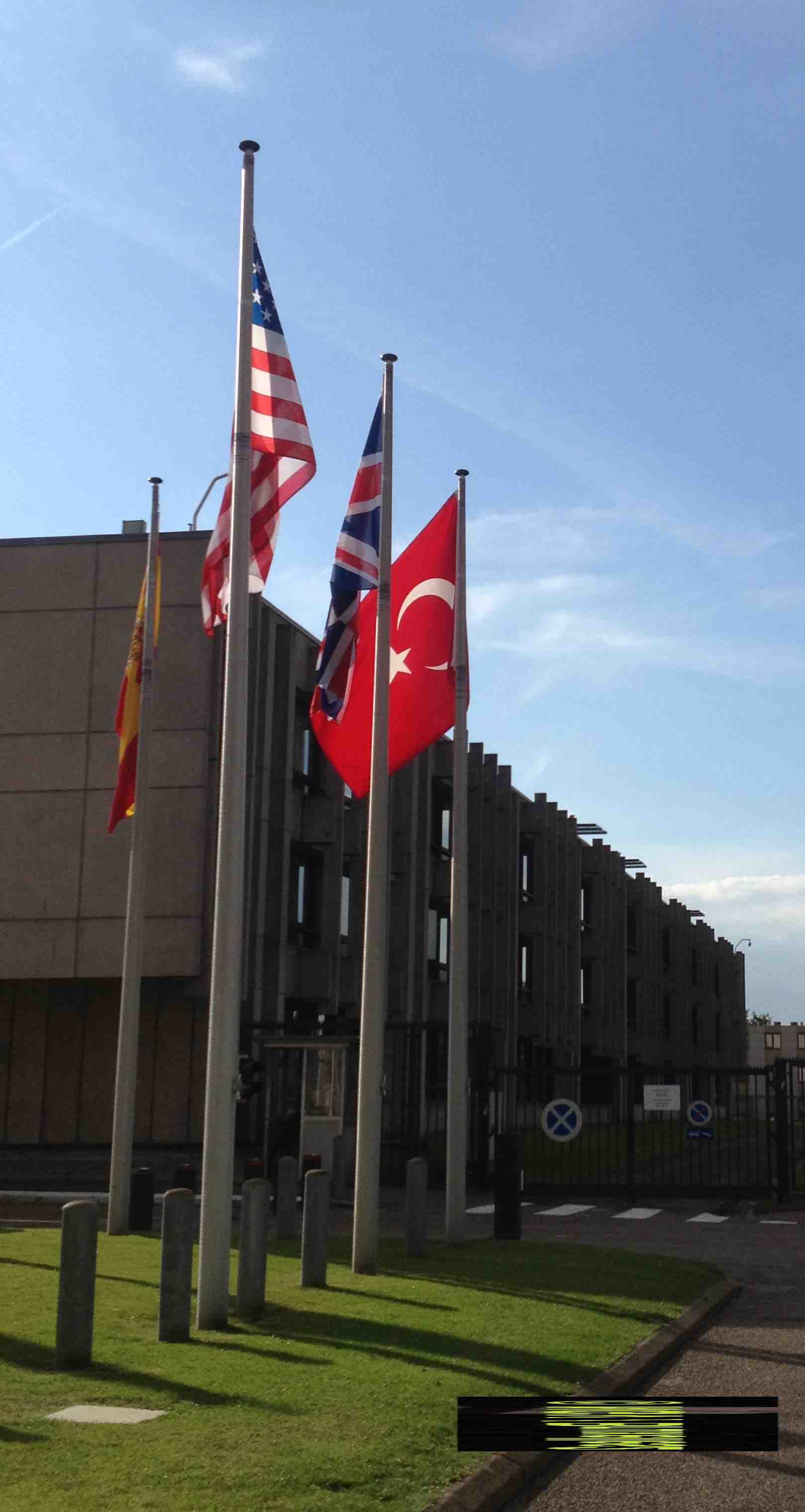Ukraine, object of a “hostile” Russian takeover? Comments

(BRUSSELS2) The will of Moscow, the government of kyiv, and the West…
A deliberate Russian will. These skirmishes this weekend (read: Skirmishes in eastern Ukraine. Kyiv reacts) will not surprise those who follow the situation in Ukraine. Moscow has never made a secret of its intentions. The strategic objective is clear: not to let Ukraine move too independently and above all to attach itself too clearly to the Western camp. The means, threats and sanctions do not matter. This is for Russia – or so it feels – a vital question. And this is the big difference with Westerners (Americans and Europeans) for whom Ukraine is, above all, a matter of principle (democracy does not discuss) and posture (not letting Moscow do its thing).
A dilemma for Kiev. The new government in kyiv finds itself, in fact, faced with a dilemma: not reacting (by force) means fueling comments about its incapacity – in fact quite real (we saw it in Crimea) – to deal with the situation. To react is to take the risk of aggravation and escalation. In fact, Ukraine is the subject of a formal attack from Moscow, not head-on, but biased, like a hostile takeover bid, from one company to another. on the stock market.
An evolving tactic. Tactics thus evolve as events unfold. We can have the impression of being tossed around according to events. It is reality. We are on a battlefield where the strategist decides, given the situation on the ground, to advance this or that pawn. After Crimea, annexed in a lightning operation, the time has come for the destabilization of Ukraine. Starting with the cities located furthest to the East. Then normally it should reach the southern edge. Our reporter Loreline Merelle returns from Odessa. And we are already seeing the first signs of a hardening of the situation on the spot, with an entrenched pro-Russian camp in the city.
All means are allowed. We could think of it the hard way. Other, more insidious means are possible. Demonstrative actions – a demonstration that gets out of hand, the storming of city buildings, etc. – are all attempts at destabilization, for the moment quite peaceful. But other means can be used. Not the intervention of the Russian army (this is the last resort if all other means have failed). But we can think of a few small “terrorist” explosions here and there, which could not only target Ukrainian targets but Russian or foreign targets. Like a well-organized provocation. Even acts reminiscent of neo-Nazis, relayed by organizations such as “Pravy Sektor” or others that could emerge (we will have to wonder one day about their role, their links and their financing… for whom do they ride? ?). The intense propaganda game is also important.
Westerners in the cabbage. Faced with this, Europeans and Americans each time seem disconcerted and surprised. The European response is, to say the least, muddled. We get active, we talk a lot. We sanction a little bit, symbolically. NATO screams like a startled virgin. Washington rolls its eyes. The OSCE deploys a few observers with a confusing and almost useless role. Everyone is in their role. And we leave slowly for 1 or 2 more weeks of crisis.
clouds of smoke. The Russian game looks confusing, when in reality it is quite simple. The “bad” Putin defends eternal Russia, Ukraine tied to Moscow, threatens to cut off gas, etc. In this, he flatters the Russian ego. And believing that it is isolated is another illusion. “Putin’s” decisions are decisions of a collective, of a sort of eternal Russia. On the front, the “nice” Sergei Lavrov, the head of Russian diplomacy, is responsible for coaxing, smoothing out the corners, rubbing balm on the wounds, to reassure his interlocutors… and to save time. The date is set: May 25. On that date, before (if possible) or after (if not), Ukraine must become ungovernable.
The best ally of the Russians: the political and economic context. The ambient disorder is complemented by a paroxysmal economic crisis. Inflation is already galloping. And it could get even worse. The gas embargo or the increase in its price should not play a favorable role. So many factors which can accelerate the feeling among the population that, decidedly, this “democratic” government is not worth “ no better than the previous ones ". Which should add to the tensions...
For Europeans, the stakes are also high. It is about not getting caught up in a game of escalation on both sides, between Moscow, on the one hand, kyiv and Washington on the other, which could lead to a new separation from the European continent. And also cause additional economic shocks at a time when the continent is still recovering from the last economic and financial crisis.
(Nicolas Gros-Verheyde)
(*) The “current events” part – which appeared in the original article at the top of this article – has been reported in a separate article – Skirmishes in eastern Ukraine. Kyiv reacts



Thank you for all your very interesting information.
Can we really be surprised by the annexation of Crimea, and now by Russian moves in eastern and southern Ukraine?
As if Russia could content itself with annexing Crimea.
It is enough to look at the map to understand that the control of this part of Ukraine is vital for Russia - except to consider that the base of Sevastopol, the access to the warm seas, the free transit of the Russian naval forces between the sea Black Sea and the Sea of Azov, no longer serves any purpose.
And even if the strategic interest of the Sevastopol base for Russia can possibly be discussed (since the Bosphorus and the Dardanelles are de facto controlled by Turkey, a NATO member), Russia, the first interested party, seems to be consider that this base is of the utmost importance.
And since Russia felt that it could no longer trust the power in place in Kiev (and the quarrels over the administration of the Sevastopol base, on the transit of Russian forces, both by land on Ukrainian territory between the Russian-Ukrainian border and Sevastopol, that by sea through the Kerch Strait, etc., are not new) how could she do otherwise than annex Crimea?
But then, how to ensure the maintenance of this landlocked base in Crimea if to access it the Russian forces are obliged to pass through Ukrainian territory whose authorities are hostile to it?
The high density of Russian speakers in these regions is a reality, but it is nothing more than an instrument for advancing Russia's strategic aims there, using the same thuggish methods as those forward the German speakers in the Sudetenland in order to ensure control of strategic Czech industries, such as the SKODA factories, for example.
After all, should we be surprised? In matters of international relations, the term thug does not mean much.
Cautious, and at the same time strong from their recent annexation of Crimea and uncertain of the success of their occult project of annexation of southern and eastern Ukraine, the Russians have just relaunched the project of a bridge making it possible to connect Crimea directly to Russian territory over the Kerch Strait.
The Germans had started building it in 1943, the Soviets had tried to finish it in 1944, and the whole, of poor quality, was soon washed away by the ice and the currents. This bridge will provide a safe alternative to the land route through Ukraine which remains, from the Russian point of view, as unreliable as the Ukrainian government.
We can be certain that this updated project will not drag on the cards, and that the bridge will indeed be built.
Great analysis once again!
I note in particular the particularly relevant elements contained in the last two paragraphs….
How not to adhere in these conditions to this call for a search notice of the real responsible for this most controversial situation to which Yann Amar invites us: http://regards-citoyens-europe.over-blog.com/2014/04/avis-de-recherche-qui-sont-les-responsables-de-la-politique-etrangere-insensee-a-l-egard-de-la-crise-ukrainienne-comme-de-la-crise-s
And meanwhile, the Commission, with the blessing of the Council, continues to act as if everyone is always handsome and always nice, especially in the west, where the sun goes down, and obviously not outside. 'Is, yet where the sun rises...
The TTIP negotiations are quietly continuing on their way, with a very momentary artificial pause, just to let European voters think that they can continue to sleep peacefully in their Europe in crisis, the European institutions take care of safeguarding their interests …..
It is more than urgent to launch a vast process of reform of this European Union 'above ground' if we have the will that it does not shatter under the repeated assaults of incompetence and diplomatic, political cynicism and technocratic!
To be a sincere Europeanist today means first of all to denounce all those errors and mistakes that have led Europeans to no longer dream of Europe! It is then to propose credible European responses to the challenges posed, and not ersatz intended to conceal that we do not want to change anything!
It's a constant fight that must be waged relentlessly!
YAPLUKA!